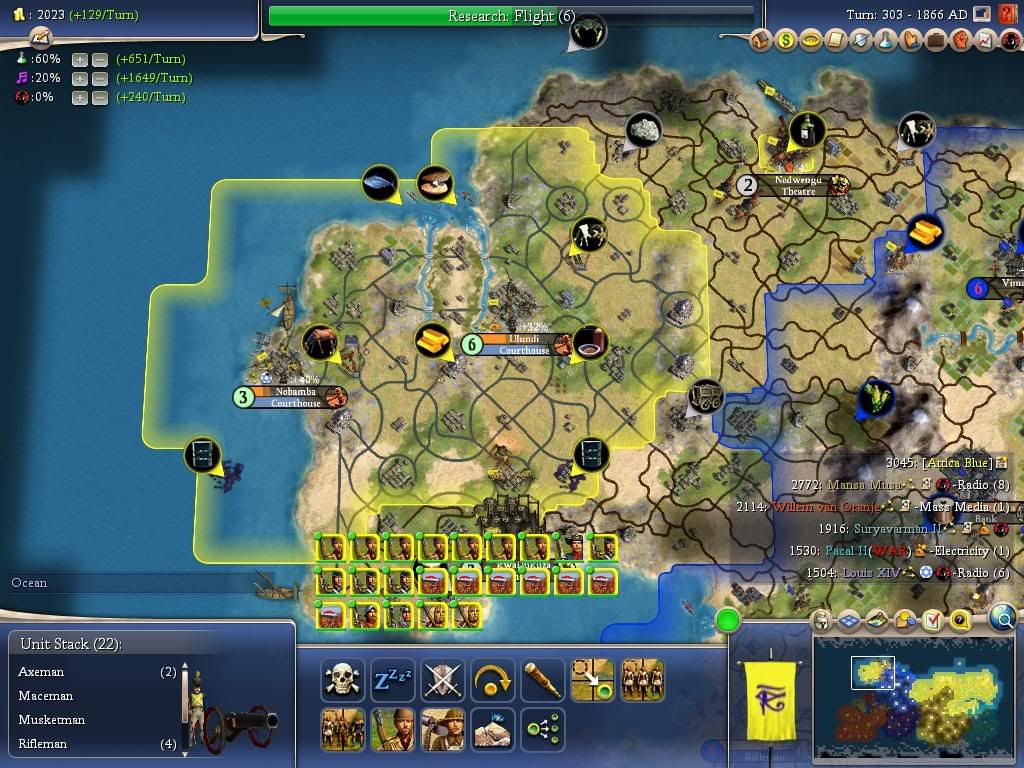Originally posted by Krill
It's only Noble, so city maintence isn't prohibitive. Building wealth helps alot as well, cities that could get a barracks and start building units can be put onto wealth, the gold in the second city helps research so that currency isn't impossible to get (I would have just finished if I hadn't got calendar immediately after researching the early techs). Building cottages and forcing the new cities to grow and work nothing but food tiles and cottages until you can slave a courthouse for 4 pop (after getting a granary first, of course) is the main way.
It's only Noble, so city maintence isn't prohibitive. Building wealth helps alot as well, cities that could get a barracks and start building units can be put onto wealth, the gold in the second city helps research so that currency isn't impossible to get (I would have just finished if I hadn't got calendar immediately after researching the early techs). Building cottages and forcing the new cities to grow and work nothing but food tiles and cottages until you can slave a courthouse for 4 pop (after getting a granary first, of course) is the main way.
I didn't slave any units at all, no need with all of the cities having alot of production tiles. Simply growing cities towards the happy cap gave me enough production. The coastal cities that built lighthouses just worked food and coastal tiles until they were large enough to work most or all of the production tiles then I moved them onto production and building units.
Also, how does the turn count work for working cottages? For example, if I start to work a tile and do it for 5 turns, then take the worker off it and put it back a few turns later, does that tile still count as having worked 5 turns toward growth or does it reset to zero?

 Anyway, they're gone now.
Anyway, they're gone now. But Shaka had to have one of the worsts starts I've ever seen. His capital was good, especially if founded on the proper square, but everything around him is dry and foodless:
But Shaka had to have one of the worsts starts I've ever seen. His capital was good, especially if founded on the proper square, but everything around him is dry and foodless:


 I'm quite sure you were quite far ahead...
I'm quite sure you were quite far ahead... ) where I was the Mongols and bee lined horseback riding for Keshiks. Had all four of my cities start building them. Prepared for war on the nearest AI, Elizabeth, who was also last in score, she had only 2 cities. Once I had 6 Keshik in my staging city, and 3 more on the way, I declared, because I could see that York had only an axeman and an archer defending. Took York, sent my now 7 strong Keshik force toward London, thinking the defenses would be similarly weak. She had 4 archers and 2 Spearmen in London.
) where I was the Mongols and bee lined horseback riding for Keshiks. Had all four of my cities start building them. Prepared for war on the nearest AI, Elizabeth, who was also last in score, she had only 2 cities. Once I had 6 Keshik in my staging city, and 3 more on the way, I declared, because I could see that York had only an axeman and an archer defending. Took York, sent my now 7 strong Keshik force toward London, thinking the defenses would be similarly weak. She had 4 archers and 2 Spearmen in London.  . After defeating the Maya, I was about half done with the French, and I had a choice. Go for domination by killing S-man and Willem, go for domination by killing Mansa, or go for the space race. Mansa had tech parity and nearly an equal size force. I could beat him, but it would be more trouble than it was worth. Willem and S-man were behind in tech and had smaller militaries, but quite frankly, I was just tired of war and couldn't be arsed. So I went spaceship.
. After defeating the Maya, I was about half done with the French, and I had a choice. Go for domination by killing S-man and Willem, go for domination by killing Mansa, or go for the space race. Mansa had tech parity and nearly an equal size force. I could beat him, but it would be more trouble than it was worth. Willem and S-man were behind in tech and had smaller militaries, but quite frankly, I was just tired of war and couldn't be arsed. So I went spaceship.



Comment